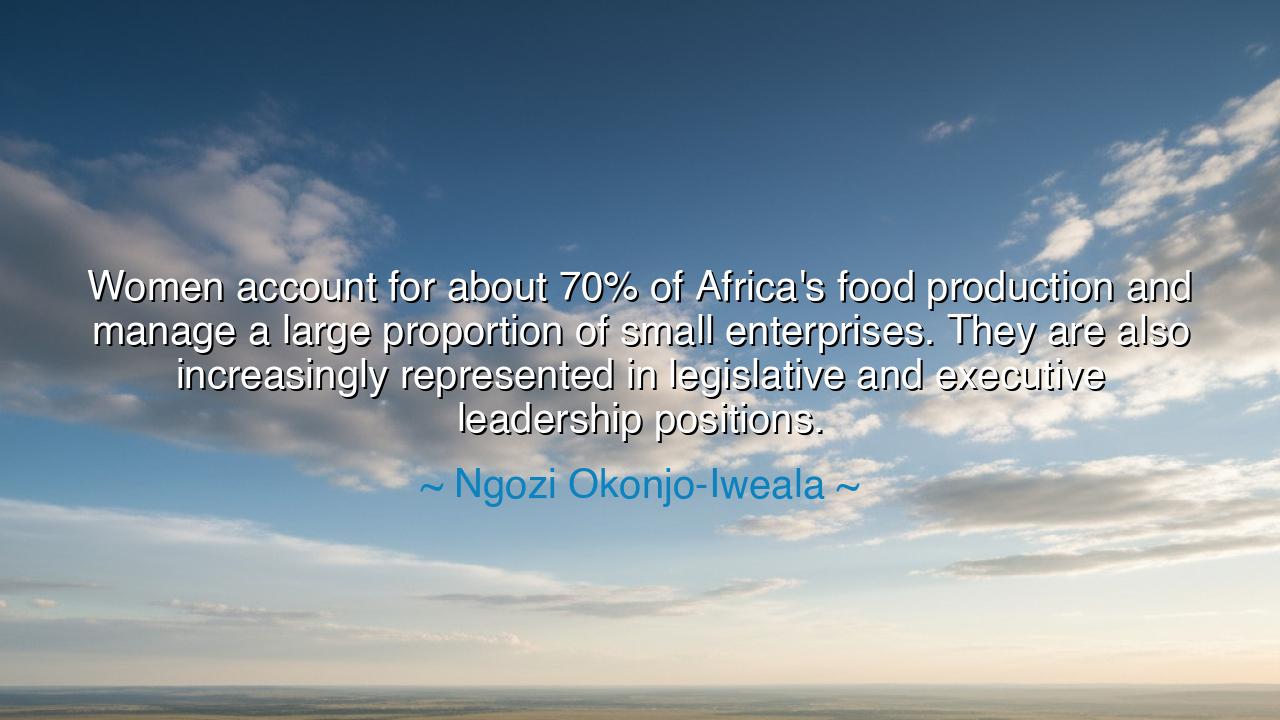
Women account for about 70% of Africa's food production and
Women account for about 70% of Africa's food production and manage a large proportion of small enterprises. They are also increasingly represented in legislative and executive leadership positions.






Ngozi Okonjo-Iweala, the daughter of Africa and a voice of courage in the councils of nations, once declared: “Women account for about 70% of Africa’s food production and manage a large proportion of small enterprises. They are also increasingly represented in legislative and executive leadership positions.” In these words, she unveils both a reality and a prophecy. The reality is that women, long unseen, have always been the backbone of African society—tilling the fields, raising the children, sustaining the economy. The prophecy is that their rise into halls of leadership marks the beginning of a new dawn, where the strength that has always been hidden will at last be fully recognized.
The origin of her words lies in the testimony of Africa’s daily life. Across villages and towns, it is the hands of women that cultivate crops, ensuring that families eat. It is their resourcefulness that sustains the countless small enterprises—the markets, the shops, the crafts—that weave together the fabric of communities. While history books may speak often of kings and warriors, the silent truth is that without the labor and ingenuity of women, there would be no society to govern, no culture to preserve, no people to endure.
Consider the example of Wangari Maathai, the Kenyan activist and Nobel Peace Prize laureate. She led the Green Belt Movement, mobilizing thousands of women to plant millions of trees. In doing so, she not only restored the land but also restored dignity to those who worked it. Her vision proved that the same hands which sow seed can also shape policy, challenge tyranny, and build nations. Here is living proof of Okonjo-Iweala’s declaration: that women, grounded in the soil of labor, can rise to the heights of leadership.
But the quote also carries within it a quiet rebuke. For though women produce most of the food, manage countless enterprises, and now step into parliaments and ministries, they have for too long been denied recognition and equal power. Their toil was taken for granted, their voices silenced, their potential ignored. Okonjo-Iweala’s words remind us that justice demands not only acknowledgment but also empowerment—that the rise of women in leadership is not a gift bestowed, but a rightful return to balance.
The deeper meaning of her words is this: the destiny of Africa, and indeed of the world, cannot be fulfilled while half its strength is stifled. To harness the full measure of human potential, societies must embrace the wisdom and power of women in every sphere—field, market, and government. For the same discipline that cultivates crops, the same ingenuity that sustains enterprises, can guide nations, resolve conflicts, and build prosperity. This is not theory but truth proven in action, from village markets to global institutions.
The lesson for us is radiant: never again should we speak of progress without including women. If you are a teacher, nurture the minds of girls as much as boys. If you are a leader, create space for women in councils of decision. If you are a citizen, honor and support the enterprises of women, for in lifting them you lift entire communities. Recognize that when women rise, societies rise with them, and when their strength is ignored, the whole people walk crippled.
Practical action lies before us. Encourage the education of girls, for from educated women come stronger nations. Support the work of women entrepreneurs, for their enterprises sustain families and build economies. Advocate for policies that increase the representation of women in parliaments, ministries, and executive councils, for their voices bring balance and vision. And in daily life, honor the women who labor unseen, remembering that every harvest, every meal, every thriving market carries their touch.
Thus Ngozi Okonjo-Iweala’s words echo like a call across generations: women are already the foundation of Africa’s strength. The time has come to recognize them, to empower them, and to walk with them as equals in leadership. For only then shall nations rise to their true height, built upon the full measure of their people’s power—both male and female, both seen and unseen, both rooted in the soil and soaring into the councils of the world.






AAdministratorAdministrator
Welcome, honored guests. Please leave a comment, we will respond soon